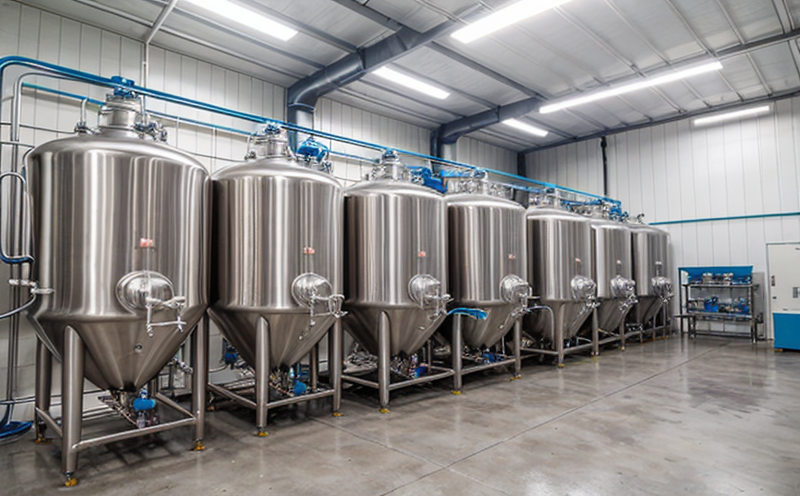FAO Pathogen Control Testing in Industrial Fermentation Processes
The Food and Agriculture Organization (FAO) pathogen control testing is a critical component of ensuring food safety, particularly in industrial fermentation processes. This service ensures that products like beverages, dairy goods, and fermented foods meet stringent safety standards set by regulatory bodies worldwide.
Pathogens such as Listeria monocytogenes, E. coli, and Campylobacter jejuni can pose significant health risks if not controlled during fermentation processes. Ensuring these pathogens are not present in the final product is paramount for maintaining consumer trust and compliance with international standards.
In this service, we employ advanced microbiological techniques to identify and quantify potential pathogen contamination. This process involves multiple steps, from sample collection to final analysis:
- Sample Collection: Samples are taken directly from the fermentation tanks or vessels at various stages of production.
- Culture Media: Specific culture media are used that promote the growth of target pathogens while inhibiting other microorganisms.
- Isolation and Identification: Once isolated, the pathogen is identified using biochemical tests and possibly molecular methods like PCR.
- Quantification: Quantitative analysis helps in determining the level of contamination, which is crucial for process optimization and compliance.
- Reporting: A detailed report is provided outlining the presence or absence of pathogens along with recommended corrective actions if any are detected.
The service is designed to support industrial fermentation processes across various sectors including food and beverage manufacturing, pharmaceuticals, and biotechnology. By adhering to international standards such as ISO 22000 and HACCP principles, we ensure that every process is meticulously controlled.
Our testing methods are aligned with FAO guidelines which emphasize the importance of pathogen control in industrial settings. This ensures that our clients can meet not only local but also global regulatory requirements, thereby enhancing their market competitiveness.
| Applied Standards | Description |
|---|---|
| ISO 21528:2013 | Microbiological examination of raw and processed foods - Sampling for the detection of Listeria monocytogenes in ready-to-eat food products. |
| ASTM E2792-16 | Standard Test Method for Detection of Salmonella spp. in Fermented Foods Using Enrichment Broth and Culture Media. |
| IEC 62457:2018 | Microbiological quality assurance for industrial fermentation processes. |
Quality and Reliability Assurance
- Stringent Laboratory Practices: Our laboratory adheres to strict ISO 17025 accreditation, ensuring that all tests are conducted under controlled conditions.
- Advanced Technology: Utilizing state-of-the-art equipment like PCR machines and automated colony counters for precise results.
- Consistent Reporting: Reports are generated using a standardized format to ensure clarity and consistency in communication.
- Training and Certification: Our staff is regularly trained on the latest techniques and methodologies to maintain accuracy and reliability.
The quality of our testing processes is further bolstered by continuous improvement initiatives. Regular audits and feedback loops ensure that any deviations from expected standards are promptly addressed, thereby enhancing overall service quality.
Competitive Advantage and Market Impact
- Regulatory Compliance: By adhering to FAO guidelines and international standards like ISO 21528 and ASTM E2792, our clients ensure compliance with local and global regulatory requirements.
- Informed Decision Making: Our detailed reports provide actionable insights that help in optimizing production processes and minimizing risks of contamination.
- Enhanced Consumer Trust: Ensuring pathogen-free products builds trust among consumers, which is crucial for brand reputation and market share.
- Competitive Edge: Meeting stringent safety standards can differentiate a company from its competitors, particularly in markets with high safety regulations.
- Long-term Relationships: Consistent quality and reliability foster long-term partnerships between our clients and us, leading to sustained business growth.
- Market Expansion: By ensuring product safety, companies can explore new markets where stringent food safety standards are enforced.
The ability to provide reliable pathogen control testing not only enhances the quality of products but also contributes significantly to a company's competitive advantage and market impact. This service is indispensable for maintaining high standards in industrial fermentation processes across various industries.





